NCERT Solutions for Class 10 English Chapter 6 - Mijbil the Otter
Oral Comprehension Check - Page No. 84
Q1: What ‘experiment’ did Maxwell think Camusfearna would be suitable for?
Ans: Maxwell thought Camusfearna would be suitable for an experiment in rearing and taming an otter as a pet. He was looking for a natural, remote, and peaceful place where such an experiment could take place, as he believed the area’s environment was ideal for the otter's habitat and his lifestyle.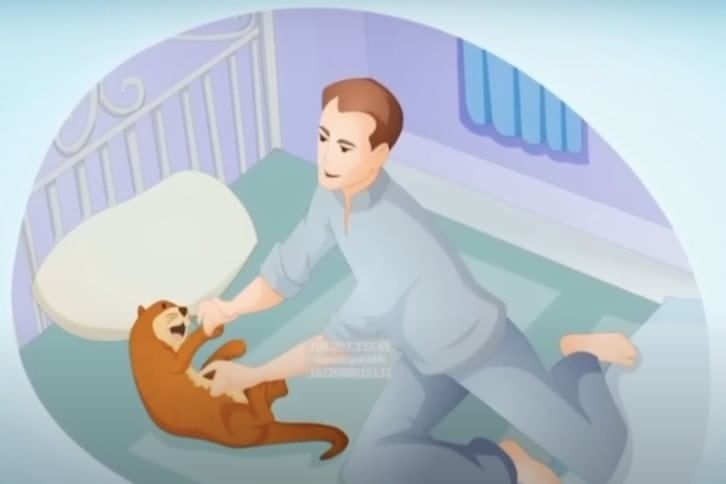
Q2: Why does he go to Basra? How long does he wait there, and why?
Ans: Maxwell went to Basra to the Consulate-General to collect and respond to his mail from Europe. However, while his friend’s mail had arrived, his own hadn’t. He called England and even made a phone call three days later, which had to be scheduled 24 hours in advance. On the first day, the phone line was down; on the second day, the exchange was closed due to a religious holiday; and on the third day, there was another technical issue. Meanwhile, his friend left, and Maxwell arranged to meet him a week later. After five days, his mail finally arrived, so Maxwell had to wait five days to receive it.
Q3: How does he get the otter? Does he like it? Pick out the words that tell you this.
Ans: When the writer's mail finally arrived, he took it to his bedroom to read. There, he noticed two Arabs sitting on the floor with a sack that occasionally moved. They handed him a note from his friend, which mentioned that he had sent him an otter. Maxwell was pleased with this, as indicated by his use of the phrase "An otter fixation" to describe his deep attachment to otters. He believed this phrase captured the strong bond that otter owners often feel. Zoologists sometimes referred to the otter as "Lutrogale Perspicillata Maxwelli," which was commonly shortened to "Maxwell's otter."
Q4: Why was the otter named ‘Maxwell’s otter’?
Ans: Zoologists often referred to the otter as "Lutrogale Perspicillata Maxwelli," giving rise to the shortened name "Maxwell's otter."
Q5: Tick the right answer. In the beginning, the otter was:
(a) aloof and indifferent
(b) friendly
(c) hostile
Ans: (c) In the beginning, the otter was aloof and indifferent.
In the beginning, the otter was aloof and indifferent because it was unfamiliar with Maxwell and its new surroundings. It showed no interest in interacting and kept to itself, displaying typical cautious behavior in a new environment.
Q6: What happened when Maxwell took Mijbil to the bathroom? What did it do two days after that?
Ans: When Maxwell first introduced Mijbil to the bathroom, the otter displayed boundless excitement in the water for the first half-hour. He eagerly plunged in, rolled around, and darted up and down the bathtub, creating a splashy commotion reminiscent of a hippo. However, after two days, Mijbil mysteriously disappeared from Maxwell's bedroom and made his way to the bathroom. There, he curiously perched at the edge of the bathtub and began fiddling with the chrome taps using his paws. The author watched in amazement as the small creature skillfully turned the tap, first producing a slow trickle of water, and eventually managing to release a full flow.
Oral Comprehension Check - Page No. 86
Q1: How was Mij to be transported to England?
Ans: Maxwell booked a flight to Paris and from there he would go on to London. The airline insisted that Mij should be packed in a box (not more than eighteen inches square) that was to be placed on the floor, near his feet.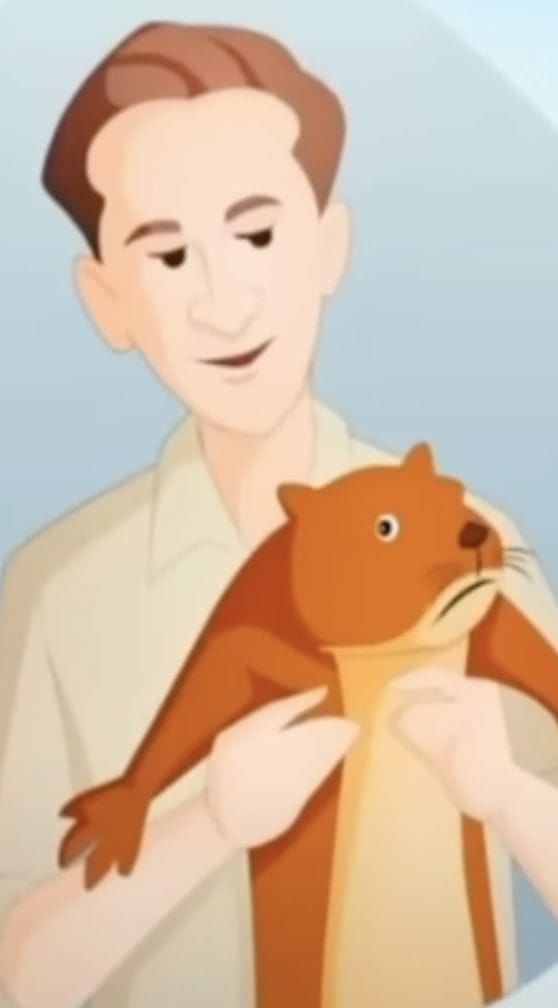
Q2: What did Mij do to the box?
Ans: The box was lined with metal sheet. Mij didn’t find it comfortable to be there so tried to escape. In its attempt to escape Mij tore into the metal lining of the box. As a result, it hurt itself and started bleeding.
Oral Comprehension Check - Page No. 87
Q3: Why did Maxwell put the otter back in the box? How do you think he felt when he did this?
Ans: Maxwell knew that there was no other way he could carry Mij to London, so he put the otter back into the box. He was anxious and felt sorry by looking at the otter’s condition as he hurt himself while trying to escape from the box.
Q4: Why does Maxwell say the air hostess was “the very queen of her kind”?
Ans: The air hostess was exceptionally kind and compassionate toward Maxwell after hearing his story. She understood his feelings and concerns about the incident with the box and allowed him to take the otter out and keep it on his knee. This gesture made the author deeply admire her, leading him to refer to her as “the very queen of her kind.”
Q5: What happened when the box was opened?
Ans: As soon as the box was opened, Mij jumped out and quickly disappeared, running all over the airplane and scaring the other passengers. The otter caused a lot of trouble, with people getting frightened by the little creature. A woman even stood up on her seat when Mij ran under the legs of a chubby man wearing a white turban. Maxwell tried to catch Mij but couldn’t. The air hostess told Maxwell not to worry and that she would help find the otter. Soon, Mijbil came back to the author, clung to his knee, and started nuzzling his face and neck.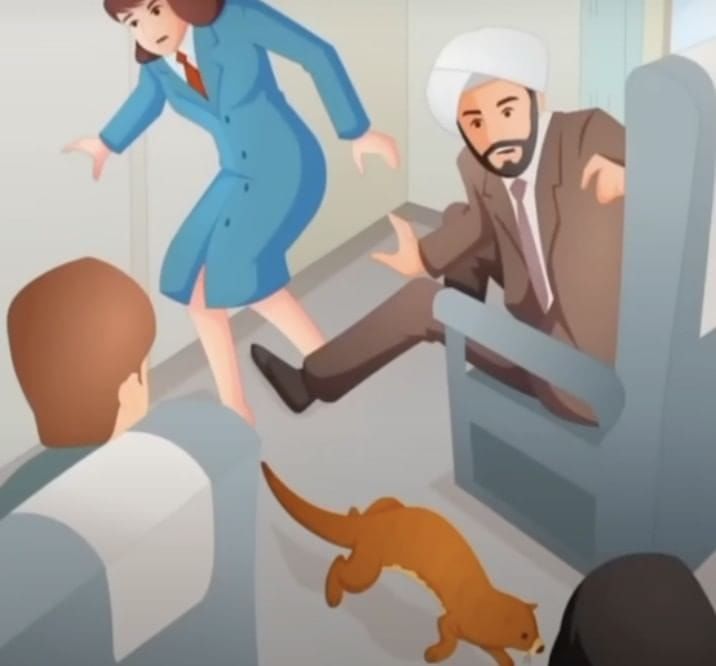
Oral Comprehension Check - Page No. 88
Q1: What game had Mij invented?
Ans: Mij devised a playful game involving a ping-pong ball. Utilizing one of the author's suitcases with a sloping lid, Mij would position the ball at the higher end of the inclined surface and then eagerly chase after it as it rolled down toward the lower end.
Q2: What are ‘compulsive habits’? What does Maxwell say are the compulsive habits of
(i) school children
(ii) Mij?
Ans: Compulsive habits often refer to unusual actions that a person repeats without a clear reason. For example, a child might choose to jump over a fence instead of using the regular path. This behavior is common in children because they tend to be playful by nature.
(i) In the story, Maxwell exhibits compulsive habits similar to those of children who, on their way to and from school, feel the need to step exactly in the center of each paving block, touch every seventh upright of the iron railings, or walk around every second lamp post.
(ii) Likewise, Mijbil also showed compulsive behavior. On his way home, he would leap over the boundary wall railing and race along its entire thirty-yard length, much to the distraction of both students and staff inside.
Q3: What group of animals do otters belong to?
Ans: Otters belong to a relatively small group of animals known as Mustellines. The other animals of this group are badger, mongoose, weasel, stoat, mink and others.
Q4: What guesses did the Londoners make about what Mij was?
Ans: Maxwell observed that the average Londoner often failed to correctly identify an otter. When Londoners caught sight of Mij, their guesses about his identity varied widely. Some speculated that he might be a baby seal, a squirrel, a walrus, a hippo, a beaver, a bear cub, a leopard, or even a brontosaur, highlighting the intriguing and diverse range of interpretations.
Thinking about the Text
Q1: What things does Mij do that tell you that he is an intelligent, friendly and fun-loving animal who needs love?
Ans: Mij showed impressive intelligence by creating its own game with ping-pong balls and skillfully turning the tap to make water for playing and splashing. Initially, Mij was shy and distant, but it gradually formed a strong bond with Maxwell. It recognized and responded to its name when Maxwell called, showing a deep connection.
Mij's attachment was so strong that it became upset when left in a box, even injuring itself while trying to escape. When Maxwell returned, Mij clung to his feet, seeking comfort and reassurance.
Mij's joyful nature was clear in its love for play, enjoying various games with toys like ping-pong balls, marbles, rubber fruit, and a terrapin shell. It thrived on the love and care from Maxwell, easily forming a heartwarming connection.
Q2: What are some of the things we come to know about otters from this text?
Ans: Otters belong to a small animal group called Mustellines, which includes animals like badgers, mongooses, weasels, stoats, and minks. Maxwell's otter, which was previously unknown, was later identified by zoologists as "Lutrogale perspicillata maxwelli" or Maxwell's otter.
These animals are commonly found in marshy areas and are often kept as pets by the Arab people. Otters have a unique habit of making sure that any water they find is spread around their environment. If there's a bowl of water, they'll either tip it over or sit in it and splash until it overflows. For otters, water always needs to be in motion, and they particularly enjoy playing games, especially with balls.
Q3: Why is Mij’s species now known to the world as Maxwell’s otter?
Ans: Maxwell’s otter was of a race previously unknown to science and was at length named by zoologistsLutrogale perspicillata maxwelli or Maxwell’s otter.
Page No: 89
Q4: Maxwell in the story speaks for the otter, Mij. He tells us what the otter feels and thinks on different occasions. Given below are some things the otter does. Complete the column on the right to say what Maxwell says about what Mij feels and thinks.

Ans: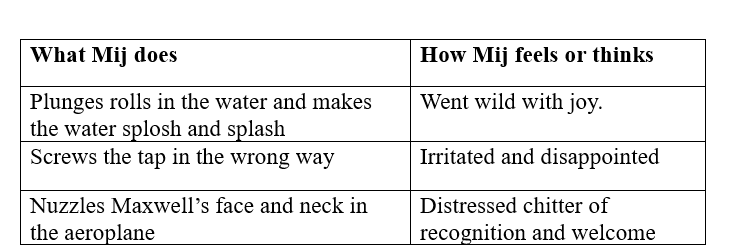
Q5: Read the story and find the sentences where Maxwell describes his pet otter. Then choose and arrange your sentences to illustrate those statements below that you think are true.
Maxwell’s description
(i) makes Mij seem almost human, like a small boy.
(ii) shows that he is often irritated with what Mij does.
(iii) shows that he is often surprised by what Mij does.
(iv) of Mij’s antics is comical.
(v) shows that he observes the antics of Mij very carefully.
(vi) shows that he thinks Mij is a very ordinary otter.
(vii) shows that he thinks the otter is very unusual.
Ans:
(i) True. The statement – “He spent most of his time in play.”
(ii) False
(iii) True. The statement – “I watched, amazed; in less than a minute he had turned the tap far enough to produce a trickle of water, and after a moment or two achieved the full flow.”
(iv) True. The statement – “Marbles were Mij’s favourite toys for this pastime: he would lie on his back rolling two or more of them up and down his wide, flat belly without ever dropping one to the floor.
(v) True. The statement – “A suitcase that I had taken to Iraq had become damaged on the journey home, so that the lid, when closed, remained at a slope from one end to the other. Mij discovered that if he placed the ball on the high end it would run down the length of the suitcase. He would dash around to the other end to ambush its arrival, hide from it, crouching, to spring up and take it by surprise, grab it, and trot off with it to the high end once more.”
(vi) False
(vii) True. The statement – “It is not, I suppose, in any way strange that the average Londoner should not recognize an otter, but the variety of guesses as to what kind of animal this might be came as a surprise to me.”
Thinking about the Language
QI: From the table below, make as many correct sentences as you can using would and/or used to, as appropriate. (Hint: First decide whether the words in italics show an action, or a state or situation, in the past.) Then add two or three sentences of your own to it. 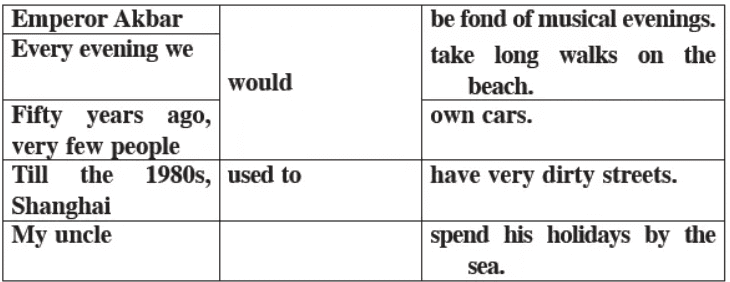 Ans:
Ans:
(i) Emperor Akbar used to be fond of musical evenings.
(ii) Every evening we used to take long walks on the beach.
(iii) Fifty years ago, very few people used to own cars.
(iv) Till the 1980s, Shanghai used to have very dirty streets.
(v) My uncle would spend his holidays by the sea.
(vi) My uncle used to take long walks on the beach.
(vii) My uncle used to be fond of musical evenings
Page No: 90
II. Noun Modifiers
Q1: Look at these examples from the text, and say whether the modifiers (in italics) are nouns, proper nouns, or adjective plus nouns.
(i) An otter fixation (ii) The iron railings
(iii) The Tigris marshes (iv) The London streets
(v) soft velvet fur (vi) A four-footed soccer player
Ans:
(i) Noun
(ii) Noun
(iii) Proper noun
(iv) Proper noun
(v) Adjective plus noun
(vi) Adjective plus noun
Q2: Given below are some nouns, and a set of modifiers (in the box). Combine the nouns and modifiers to make as many appropriate phrases as you can. (Hint: The nouns and modifiers are all from the texts in this book.)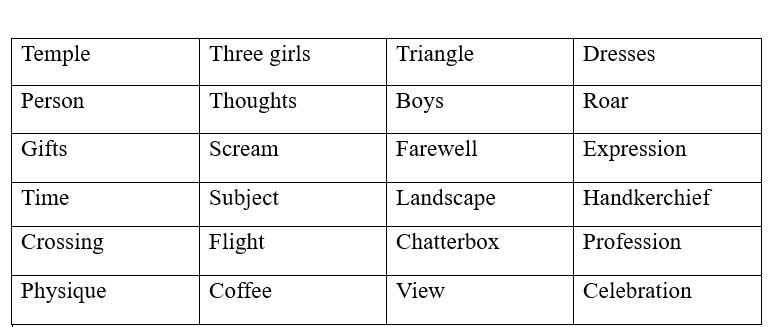
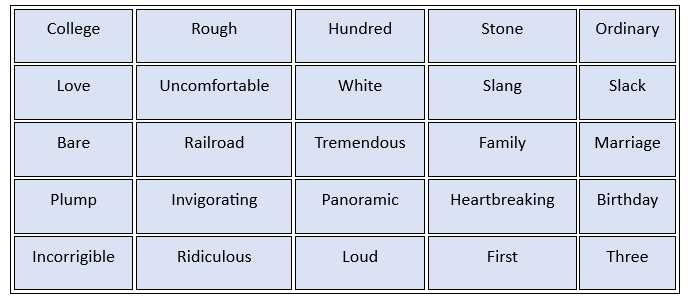
Ans:
Temple − white temple, stone temple, first temple
Person − incorrigible person, ridiculous person
Gifts − hundred gifts, ordinary gifts, birthday gifts
Time − college time, rough time, first time
Crossing − railroad crossing, first crossing
Physique − plump physique, ordinary physique
Three girls − first three girls, incorrigible three girls
Thoughts − incorrigible thoughts, uncomfortable thoughts, ridiculous thoughts, heartbreaking thoughts, first thoughts, ordinary thoughts
Scream − tremendous scream, scream
Subject − college subject, ordinary subject
Flight − rough flight, first flight
Coffee − invigorating coffee, ordinary coffee
Triangle − love triangle
Boys − college boys, incorrigible boys, rough boys, hundred boys
Farewell − college farewell, heartbreaking farewell
Landscape − bare landscape, rough landscape, white landscape
Chatterbox − incorrigible chatterbox
View − tremendous view, panoramic view, ordinary view
Dresses − hundred dresses, ordinary dresses, birthday dresses, marriage dresses
Roar − tremendous roar, loud roar
Expression − bare expression, slang expression, slack expression
Handkerchief − white handkerchief, ordinary handkerchief
Profession − family profession, first profession, ordinary profession
Celebration − tremendous celebration, family celebration, birthday celebratio
Page No: 91
III.
Q1: Match the words on the left with a word on the right. Some words on the left can go with more than one word on the right.
(i) a portion of – blood
(ii) a pool of – cotton
(iii) flakes of – stones
(iv) a huge heap of – gold
(v) a gust of – fried fish
(vi) little drops of – snow
(vii) a piece of – water
(viii) a pot of – win
Ans: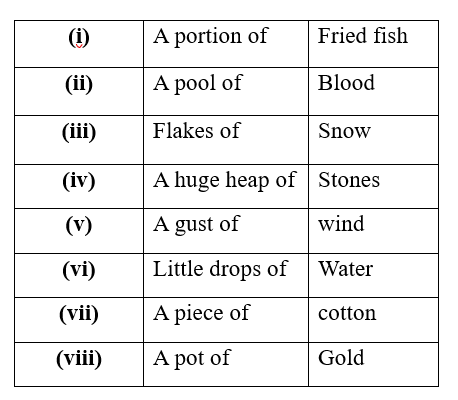
Q2: Use a bit of/a piece of/a bunch of/a cloud of/a lump of with the italicized nouns in the following sentences. The first has been done for you as an example.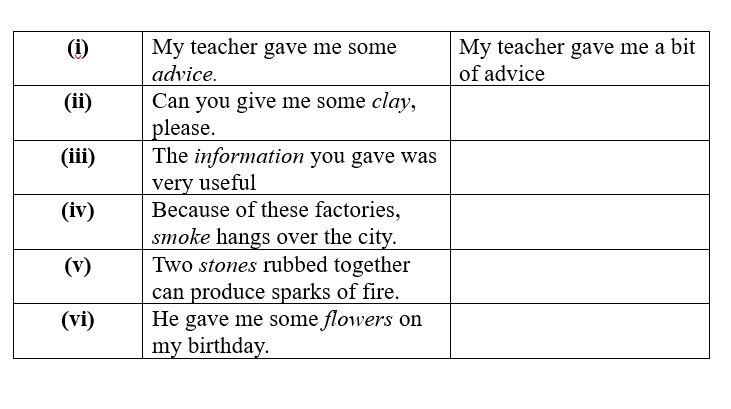
Ans: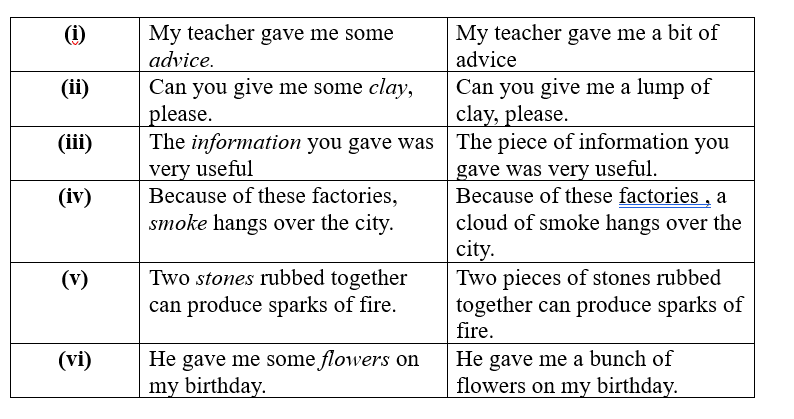
|
61 videos|616 docs|69 tests
|
FAQs on NCERT Solutions for Class 10 English Chapter 6 - Mijbil the Otter
| 1. What is the main theme of "Mijbil the Otter" ? |  |
| 2. How does the author describe Mijbil's character in the story ? |  |
| 3. What challenges does the narrator face in taking care of Mijbil ? |  |
| 4. How does Mijbil adapt to his new environment with the narrator ? |  |
| 5. What lessons can be learned from the relationship between the narrator and Mijbil ? |  |

















